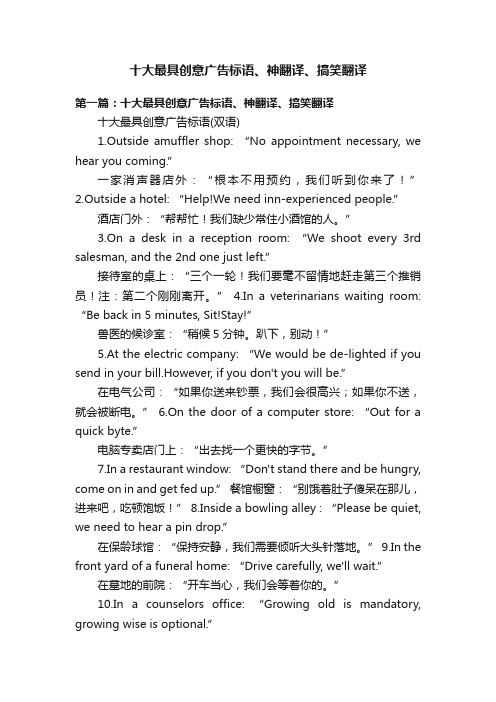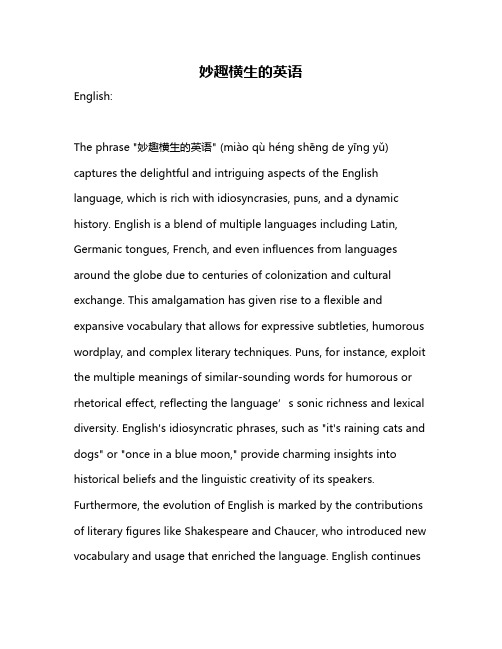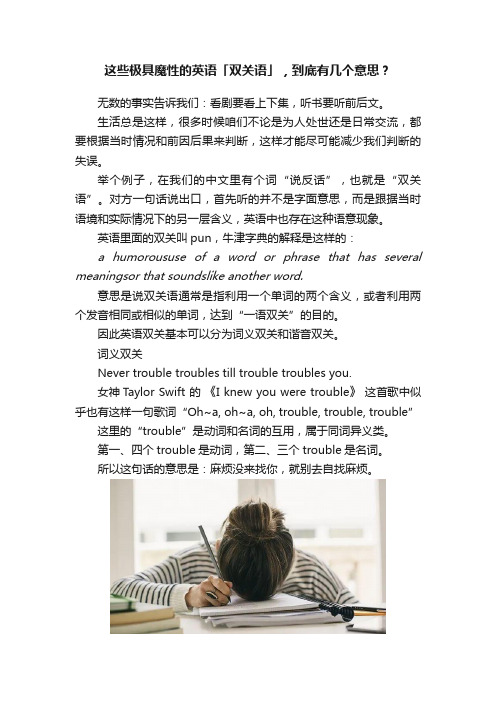广告中妙趣横生的英语双关语
广告英语中的双关语

广告英语中的双关语学位论文原创性声明本人郑重声明:所呈交的论文是本人在导师的指导下独立进行研究所取得的研究成果。
除了文中特别加以标注引用的内容外,本论文不包含任何其他个人或集体已经发表或撰写的成果作品。
对本文的研究做出重要贡献的个人和集体,均已在文中以明确方式标明。
本人完全意识到本声明的法律后果由本人承担。
作者签名:日期:年月日摘要在竞争激烈的商品时代,广告对产品的销售,企业的壮大起着举足轻重的作用。
别出心裁的广告语往往能促进产品的推广,刺激消费,并且给人以美的享受。
广告英语中的双关语正是起着画龙点睛的作用。
本文提出广告英语中双关语可分为语音双关、语义双关、语法双关、仿拟双关和借代双关,指出广告英语中双关语具有简洁、创新、趣味、和美学性等特点。
广告英语中成功地运用双关语可传递信息、吸引注意、刺激消费。
关键词:广告英语双关语分类特点作用AbstractIn a highly competitive commercial age, advertisements play a decisive role in promoting the goods and strengthening the enterprises. An original advertisement can facilitate the publicity of a certain product, stimulate the consumption and give people the enjoyment of beauty. Puns in the advertising English serve as a finishing touch. The article proposes that puns in advertising English can be divided into phonological puns, semantic puns, grammatical puns, parody puns and metonymy puns. It points out that puns in advertising English is characterized with being concise, innovative, amusing and aesthetical. Successful employment of puns in advertising English may deliver information, attract people’s attention and stimulate consumption.Key words: advertising English puns classification features function目录摘要............................................................................................................................. i ii Abstract ......................................................................................................................... i v Ⅰ.引言.. (1)II.文献综述 (1)2.1国内研究综述 (1)2.2国外研究综述 (2)Ⅲ.广告中的双关语 (2)3.1双关语的定义 (2)3.2双关语的分类 (3)3.2.1语音双关 (3)3.2.2语义双关 (4)3.2.3语法双关 (5)3.2.4拟仿双关 (5)3.2.5借代双关 (6)3.3广告英语中的双关语的特点 (7)3.3.3简洁性 (7)3.3.2创新性 (7)3.3.3趣味性 (8)3.3.4美学性 (8)3.4广告英语双关语的作用 (8)3.4.1传递信息 (8)3.4.2吸引注意 (9)3.4.3刺激消费 (9)3.4.4避免社会禁忌 (10)Ⅳ.结语 (10)4.1研究发现 (10)4.2局限性 (11)参考文献 (12)致谢Ⅰ引言广告,作为人们一种特殊的交际的模式,是消费者了解商品的一个重要途径。
十大最具创意广告标语、神翻译、搞笑翻译

十大最具创意广告标语、神翻译、搞笑翻译第一篇:十大最具创意广告标语、神翻译、搞笑翻译十大最具创意广告标语(双语)1.Outside amuffler shop: “No appointment necessary, we hear you coming.”一家消声器店外:“根本不用预约,我们听到你来了!”2.Outside a hotel: “Help!We need inn-experienced people.”酒店门外:“帮帮忙!我们缺少常住小酒馆的人。
”3.On a desk in a reception room: “We shoot every 3rd salesman, and the 2nd one just left.”接待室的桌上:“三个一轮!我们要毫不留情地赶走第三个推销员!注:第二个刚刚离开。
” 4.In a veterinarians waiting room: “Be back in 5 minutes, Sit!Stay!”兽医的候诊室:“稍候5分钟。
趴下,别动!”5.At the electric company: “We would be de-lighted if you send in your bill.However, if you don't you will be.”在电气公司:“如果你送来钞票,我们会很高兴;如果你不送,就会被断电。
” 6.On the door of a computer store: “Out for a quick byte.”电脑专卖店门上:“出去找一个更快的字节。
”7.In a restaurant window: “Don't stand there and be hungry, come on in and get fed up.” 餐馆橱窗:“别饿着肚子傻呆在那儿,进来吧,吃顿饱饭!” 8.Inside a bowling alley : “Please be quiet, we need to hear a pin drop.”在保龄球馆:“保持安静,我们需要倾听大头针落地。
妙趣横生的英语

妙趣横生的英语English:The phrase "妙趣横生的英语" (miào qù héng shēng de yīng yǔ) captures the delightful and intriguing aspects of the English language, which is rich with idiosyncrasies, puns, and a dynamic history. English is a blend of multiple languages including Latin, Germanic tongues, French, and even influences from languages around the globe due to centuries of colonization and cultural exchange. This amalgamation has given rise to a flexible and expansive vocabulary that allows for expressive subtleties, humorous wordplay, and complex literary techniques. Puns, for instance, exploit the multiple meanings of similar-sounding words for humorous or rhetorical effect, reflecting the language’s sonic richness and lexical diversity. English's idiosyncratic phrases, such as "it's raining cats and dogs" or "once in a blue moon," provide charming insights into historical beliefs and the linguistic creativity of its speakers. Furthermore, the evolution of English is marked by the contributions of literary figures like Shakespeare and Chaucer, who introduced new vocabulary and usage that enriched the language. English continuesto evolve today, integrating new terms from technology and modern culture, demonstrating its ability to adapt and grow. Its inherent flexibility allows it to absorb new ideas and linguistic constructs, making it a vibrant and evolving medium of human expression. The pleasure of engaging with English lies not just in its utility and global reach, but also in its capacity to surprise and delight with its endless variations and expressive depth.中文翻译:“妙趣横生的英语”这个短语捕捉了英语这种语言的愉快与引人入胜的方面,英语丰富的个性化表达、双关语和动态历史构成了其独特魅力。
这些极具魔性的英语「双关语」,到底有几个意思?

这些极具魔性的英语「双关语」,到底有几个意思?无数的事实告诉我们:看剧要看上下集,听书要听前后文。
生活总是这样,很多时候咱们不论是为人处世还是日常交流,都要根据当时情况和前因后果来判断,这样才能尽可能减少我们判断的失误。
举个例子,在我们的中文里有个词“说反话”,也就是“双关语”。
对方一句话说出口,首先听的并不是字面意思,而是跟据当时语境和实际情况下的另一层含义,英语中也存在这种语意现象。
英语里面的双关叫pun,牛津字典的解释是这样的:a humoroususe of a word or phrase that has several meaningsor that soundslike another word.意思是说双关语通常是指利用一个单词的两个含义,或者利用两个发音相同或相似的单词,达到“一语双关”的目的。
因此英语双关基本可以分为词义双关和谐音双关。
词义双关Never trouble troubles till trouble troubles you.女神Taylor Swift 的《I knew you were trouble》这首歌中似乎也有这样一句歌词“Oh~a, oh~a, oh, trouble, trouble, trouble”这里的“trouble”是动词和名词的互用,属于同词异义类。
第一、四个trouble是动词,第二、三个trouble是名词。
所以这句话的意思是:麻烦没来找你,就别去自找麻烦。
Less bread. No jam.如果你把它翻译成“少一些面包,不要果酱”就错啦!其实这是伦敦车站的广告语,如何理解呢?原来,在俚语中,bread有“钱”的意思,而jam则有“交通堵塞”的意思。
因此,这个句子要表达的真正意思是:乘坐伦敦地铁,省钱省时又省心。
谐音双关老友记中有一集6个人在玩你画我猜,Rachel在画板上画了个豆子一样的东西,于是Ross 大喊 bean!bean!但是无奈总是猜不中,这时Joey 开启神回复模式大喊一句:The Unbearable Lightness of Being! (因为bean跟being的发音非常像)。
浅析英语广告中双关语的运用及翻译 英文

1. IntroductionAdvertising is a kind of mass media, its final purpose is to spread information and change the attitude of consumers, induce consumers to buy the products, and thereby the advertisers get the profits.1The basis of advertising language are concise, lively, and imaginative that be taken the central position. Advertising makes use of promote principle and draws up the vivid and interesting pictures and words to arouse the consumers’ attention s in the twinkling of an eye, stimulates the readers desire to get in on your offer. Modern society is a commercial economy, advertisements are everywhere. Forms of advertisements are varied and the rhetorical devices of advertisements are plentiful: personification, antithetical parallelism, exaggeration, contrast, parallelism, rhymes, and pun provides the artistic aesthetic feeling to the readers.The pun, in Italian, “punctilio” means “a fine point,” hence a verbal quibble, and is most likely the source of the English punctilious. pun is defined by Webste r as “the humorous use of a word, or of words which are formed or sounded alike but have different meanings, in such a way as to play on two or more of the possible application; a play on words.”2 Pun is a skill that always been used in the creative work of advertisements. It can express the double meaning in the particular language environment, the bright and shadow mutual effect arouse the readers’interest and imaginations. Pun is concise, humorous and novel, can give room for thinking that been favored by large numbers of advertisements. So the application of puns in English advertisements and its translation are very important.Though more and more scholars do research on pun’s translation now, their researches are mainly about translation strategies and they rarely aim at dealing with barriers of translating puns particularly about a lot of detailed examples. Thus, this thesis is to discuss the cultural and linguistic barriers in pun translation through some examples, and the application of puns and its translation. Then several translation methods have been proposed in solving the problems in translating puns from English to Chinese.This thesis could also enable readers to have a better understanding of the functions of puns in advertisements as well as their crucial roles in advertisements.1孙晓丽,《广告英语与实例》(北京:中国广播电视出版社,1995),3-4。
英语笑话-妙趣横生的双关语

英语笑话
妙趣横生的双关语
英语中的双关语随处可见,尤其在广告语中的更常见,使广告更加俏皮、幽默、生动形象,从而增强广告的说服力,使产品形象深入人心。
如:
美国有一家眼镜公司的产品牌子是OIC,读作Oh, I see.
这则广告生动地运用了谐音双关,这三个大写字母形状像眼镜,同时,这个广告语又表达了视力不佳的人戴上这个品牌的眼镜后看见清晰的世界的喜悦之情,真是一则富有感染力的广告。
再比如一则海滨浴场的广告语:
More sun and air for your son and your heir .
我们这里有充足的阳光,清新的空气,这对您的儿子——您事业和财产的继承人——大有裨益。
这则广告巧妙地利用sun,son和air,heir这两组同音异义词,使广告读起来朗朗上口,从而吸引。
浅谈广告英语中双关语_杜撰词_仿拟_明喻和暗喻的翻译

别致等修辞效果 , 能够突出广告的特点 , 因而在广 告中得到大量应用 ” [1 ]。 英语双关可以分为: 谐音双 关 ( homo phonic puns) 和语义双关 ( homog raphic puns) 。 1. 谐音双关 。谐音双关是用发音相同或相近而 拼写和词义根本不同的词构成的。 此类双关具有风 趣、 幽默 、 俏皮 、 滑稽的语言风格 , 能增强广告的 感染力 , 给广告受者留下深刻的印象。 如:
收稿日期 :
2002-03-25
作者简介 : 刘荣征 ( 1964 — ) , 男 , 河北灵寿县人 , 硕士研究生 , 研究方向 : 应用语言学与教学法 。
76 译文 : 尽情大吃 , 不增体重 。
中国地质大学学报 (社会科学版 ) A 11 is w ell tha t ends well [ 11] . 译文 : 烟蒂好 , 烟就好 。
(果汁 ) 这两个词生造而来 , 可直译为 “果汁 ”。
( 2) T he or ang emo stest drink in the wo r ld. 译文 : 世界上最浓的桔汁饮料 。
在这则广告标题里 , 广告作者把 “ o rang e ” 与 “ much ” (多 ) 的最高级 “ mo st” (最多 ) 和形容词最 高 级 的 后 缀 “ 一 est ” 合 起 来 , 杜 撰 了 “ o ra ng em ostest” 一词 , 强调这种饮料中桔汁含量最 高、 口味最浓。
第 2 卷第 4期
刘荣 征 : 浅谈广告英语中双关语 、 杜撰词 、 仿拟 、 明喻和暗喻的翻译
77
2. 意译法 。若直译不符合译文语言习惯或无法 直译 , 可采用意译法处理译 , 出其实际的意思 。 例 如:
英文双关语大全

英文双关语大全双关语(puns)是一种利用词语的多义性或相似音的双重意义来制造幽默效果的修辞手法。
它在英语中被广泛使用,不仅能够增加笑点,还能够提高听众的兴趣和理解力。
本文将为大家提供一些常见的英文双关语,帮助大家更好地理解和运用这一修辞手法。
1. 动物类•Why do bees have sticky hair? Because they use honeycombs.•What do you call a bear without any teeth? A gummy bear.•How does a penguin build its house? Igloos it together.2. 食物类•I’m reading a book about anti-gravity. It’s impossible to put down!•I used to be a baker, but I couldn’t make enough dough.•Why did the tomato turn red? Because it saw the salad dressing.3. 职业类•The math teacher went crazy with the blackboard. He did a number on it.•I used to be a baker, but I couldn’t make enough dough.•The butcher backed into the meat grinder and got a little behind in his work.4. 自然界类•Time flies like an arrow; fruit flies like a banana.•Did you hear about the mathematician who’s afraid of negative numbers? He will stop at nothing to avoid them!•Two antennas met on a roof, fell in love, and got married. The ceremony wasn’t much, but the reception was excellent!5. 日常生活类•I’m re ading a book about anti-gravity. It’s impossible to put down!•I used to be a baker, but I couldn’t make enough dough.•The man who fell into an upholstery machine is now fully recovered.6. 健康类•The patient refused the nurse’s offer to draw his blood because he didn’t have any to spare.•Why did the scarecrow win an award? Because he was outstanding in his field!•Why don’t skeletons fight each other? They don’t have the guts.7. 爱情类•Time flies like an arrow; fruit flies like a banana.•Did you hear about the mathematician who’s afraid of negative numbers? He will stop at nothing to avoid them!•Two antennas met on a roof, fell in love, and got married. The ceremony wasn’t much, but the reception was excellent!8. 科学类•Why don’t scientists trust atoms? Because they make up everything!•I’m reading a book about anti-gravity. It’s impossible to put down!•The man who fell into an upholstery machine is now fully recovered.以上只是一部分常见的英文双关语,通过运用这些双关语,我们可以增加交流的乐趣,提高语言的表达力。
- 1、下载文档前请自行甄别文档内容的完整性,平台不提供额外的编辑、内容补充、找答案等附加服务。
- 2、"仅部分预览"的文档,不可在线预览部分如存在完整性等问题,可反馈申请退款(可完整预览的文档不适用该条件!)。
- 3、如文档侵犯您的权益,请联系客服反馈,我们会尽快为您处理(人工客服工作时间:9:00-18:30)。
广告中妙趣横生的英语双关语
《新概念英语》这套地道的英语学习教材中有许多经典的修辞手法,如比喻、拟人、夸张、反语等,这些方法的运用使得新概念中的文章篇篇成为了经典。
其中双关语的应用就充分反应了这一点。
双关语是文学语篇中常见的修辞格,目的是通过在特定语境中一个词可能有双重含义,或一个词语跟其读音相同或相近的另外一个词可能存在的联系,制造出幽默、讽刺或传达思想的效果。
另一方面双关不仅仅是一种修辞方法,更是一种语言文化的集中反应。
在新概念第三册第十九课A very dear cat中就运用了双关语dear,使得文章妙趣横生。
在这篇文章中,dear一词有两种含义:第一,表示心爱的、宝贝的(loved, cherished),说明老妇人对与自己相依为命的猫的喜爱。
第二,表示昂贵的(high-priced, expensive),这只猫被绑架后花费了她昂贵的赎金,于是这个dear便又被赋予了这第二层含义。
英语中的双关语随处可见,尤其在广告语中的更常见,使广告更加俏皮、幽默、生动形象,从而增强广告的说服力,使产品形象深入人心。
如:
美国有一家眼镜公司的产品牌子是OIC,读作Oh, I see.
这则广告生动地运用了谐音双关,这三个大写字母形状像眼镜,同时,这个广告语又表达了视力不佳的人戴上这个品牌的眼镜后看见清晰的世界的喜悦之情,真是一则富有感染力的广告。
再比如一则海滨浴场的广告语:
More sun and air for your son and your heir.
我们这里有充足的阳光,清新的空气,这对您的儿子--您事业和财产的继承人--大有裨益。
这则广告巧妙地利用sun,son和air,heir这两组同音异义词,使广告读起来朗朗上口,从而吸引更多的游人。
除了谐音双关之外,英语中还有许多语义上的双关,利用英语中一词多义的的特点,"言在此而意在彼",形成一种含蓄的表达效果,激发消费者的购买欲。
请看下面一则广告:
Money doesn't grow on trees
But it blossoms at our branches
钱不能长在树上,在我们"行"就能。
这是英国劳埃德银行(Lloyd Bank)做的户外广告。
第二句中的branch就是一个多义词,承接第一句中的trees,可以理解为"树枝";更深层的含义就是广告中的银行分行、支行的意思。
所以广告的真正含义是告诉人们到劳埃德银行来存款就能使自己的钱增值。
再看一则深入人心的香烟广告:
I'm More satisfied.摩尔香烟,我更满意。
Ask for More.再来一支,还是摩尔。
在这则广告中,香烟牌子More的含义"更加,更多",使人们在记住广告的同时一下子就记住了香烟的牌子,可谓是广告中双关语运用的典范。
总之,双关语的运用使文章言简意赅又意味深长,同时又轻而易举地为读者留下深刻的印象,大家在学习英语的过程中可以仔细体会其中的奥妙,在阅读中不断积累,也可以在日常交流或者写作中大胆运用,使英语学习不再是枯燥语法词汇的堆砌,而是充满了乐趣和魅力的精彩之旅。
